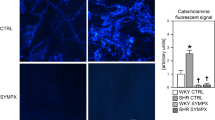Abstract
Repeated daily administration of an oral dose of 1000 mg of alpha-methyl-dopa (methyl dopa) to conscious dogs produced a conditioned adaptive hypertensive systolic and diastolic arterial pressure response along with the direct hypotensive pharmacological effect. The lower dose of 500 mg/day appeared to be devoid of direct or adaptive response effects, while the higher dose of 2000 mg/day only produced a blood pressure lowering response. The abrupt drug withdrawal unmasking the homeostatic state resulted in a marked systolic and diastolic pressor response which endured for about 10-days with peak effect reached at 17-days after termination of drug treatment. Comparable results were obtained whether the dogs were evaluated while in their normal horizontal body position or in a repositioned upright condition.
Similar content being viewed by others
References
Brogden, W. S., and Gantt, W. H.: Intraneural conditioning: cerebellar con- ditioned reflexes.Arch. Neurol. Psychiat.,48:437–445, 1942.
Brown, M. L., and Korol, B.: Surgical preparation of externalized carotid artery loops in dogs.Physiol. Behav.,3:207–208, 1968.
Carlsson, A., and Lindqvist, M.: In-vivo decarboxylation of α-methyl dopa and α-methyl metatyrosine.Acta. Physiol. Scand.,54:87–96, 1962.
Doeve, W. C. A.: Die abnormen Kaubewegungen mit erhohter Salivation nach Atropinstitlationen ins Auge von Himd und Katze.Z. Tiermed,18:77–91, 1914.
Dollery, C. T., and Harrington, M.: Methyldopa in hypertension: Clinical and pharmacological studies.Lancet,1:759–764, 1962.
Finch, G.: Salivary conditioning in atropinized dogs.Am. J. Physiol.,124: 136–141, 1938.
Gantt, W. H., Katzenelbogen, S., and Loucks, R. G.: An attempt fo condition adrenalin hyperglycemia.Bull. John Hopkins Hosp.,60:400–411, 1937.
Henning, M., and Van Zwieten, P. A.: Central hypotensive effect of α-methyl dopa.J. Pharm. Pharmacol.,20:409–418, 1968.
Korol, B., Sletten, I. W., and Brown, M. L.: Conditioned physiological adapta- tion to antieholinergic drugs.Am. J. Physiol.,211:911–914, 1966.
Korol, B., and Brown, M. L.: The role of the beta-adrenergic system in behavior: antidepressant effects of propranolol.Cur. Ther. Res.,9:269- 279, 1967.
Lang, W. J., Brown, M. L., Gershon, S., and Korol, B.: Classical and physio- logical adaptive conditioned responses to anticholinergic drugs in con- scious dogs.Int. J. Neuropharmacol.,5:311–315, 1966.
Mulinos, W. G., and Lieb, C. C.: Pharmacology of learning.Am. J. Physiol.,90:456–457, 1929.
Wikler, A.: Recent progress in research on the neurophvsiologic basis of morphine addiction.Am. J. Psychiat.,105:329–338, 1948.
Wilder, A.: Conditioning of successive adaptive responses to the initial effects of drugs.Cond. Reflex,8:193–210, 1973.
Author information
Authors and Affiliations
Additional information
Medical Research Information System (MRIS) Number 4675-01.
Rights and permissions
About this article
Cite this article
Korol, B., McLaughlin, L.J. A homeostatic adaptive response to alpha-methyl-dopa in conscious dogs. Pav. J. Biol. Sci. 11, 67–75 (1976). https://doi.org/10.1007/BF03000285
Issue Date:
DOI: https://doi.org/10.1007/BF03000285




